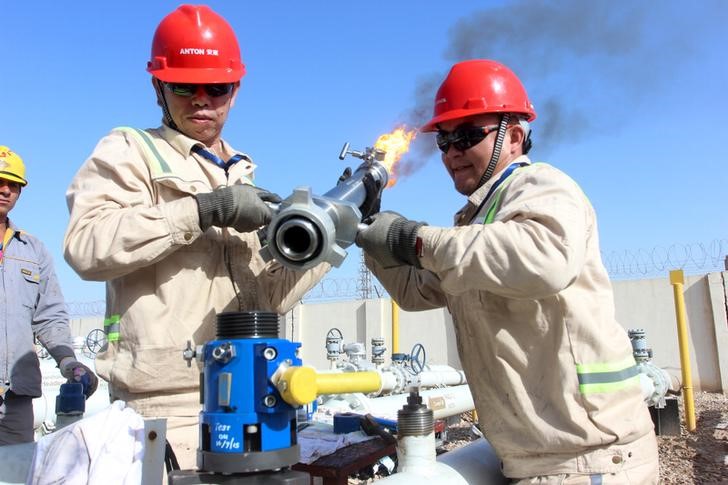Investing.com - Crude prices fell in Asia on Tuesday ahead of industry estimates on U.S. supplies and renewed caution on prospects for an agreement among major producers to freeze output.
The American Petroleum Institute will release its estimates of U.S. crude and refined product stockpiles at the end of last week on Tuesday evening with the figures followed by more closely watched data from the U.S. Department of Energy on Wednesday.
Crude oil for October delivery on the New York Mercantile Exchange eased 0.25% to $47.29 a barrel.
Overnight, oil prices fell sharply in North American trade on Monday, extending overnight losses as investors chose to cash in their gains following this month's impressive rally, which analysts warned was not justified by fundamentals.
Meanwhile, on the ICE Futures Exchange in London, Brent oil for October delivery sank $1.37, or 2.71%, to trade at $49.55 a barrel after touching a high of $51.22 on Friday, a level not seen since June 22.
London-traded Brent futures surged $3.91, or 8.32%, last week, marking the best weekly gain since early April, as investors continued to bid up prices amid speculation major oil producers, led by Saudi Arabia and Russia, are reconsidering a collective production freeze in an effort to boost the market.
Crude futures are up almost $10 a barrel, or nearly 25%, from their August 2 lows, as the prospect of an output freeze by major producers sparked a massive rally.
The market started to recover a little over two weeks ago, when Saudi Arabia’s energy minister said the country would work with other oil producers to stabilize prices at an informal OPEC meeting in Algeria next month.
The rally received additional support after Russia expressed willingness to participate in those talks, which some say could lead to a pact to freeze production levels.
However, market analysts remained skeptical that the meeting would result in any concrete actions.
An attempt to jointly freeze production levels earlier this year failed after Saudi Arabia backed out over Iran's refusal to take part of the initiative, underscoring the difficulty for political rivals to forge consensus.
Despite recent gains, indications of an ongoing recovery in U.S. drilling activity combined with elevated stocks of fuel products around the world is expected to keep prices under pressure in the near-term.
According to oilfield services provider Baker Hughes, the number of rigs drilling for oil in the U.S. last week increased by 10 to 406, the eighth consecutive weekly rise and the 11th increase in 12 weeks.
Some analysts have warned that the current rally in prices could be self-defeating, as it encourages U.S. shale producers to drill more, underlining concerns over a global supply glut.
